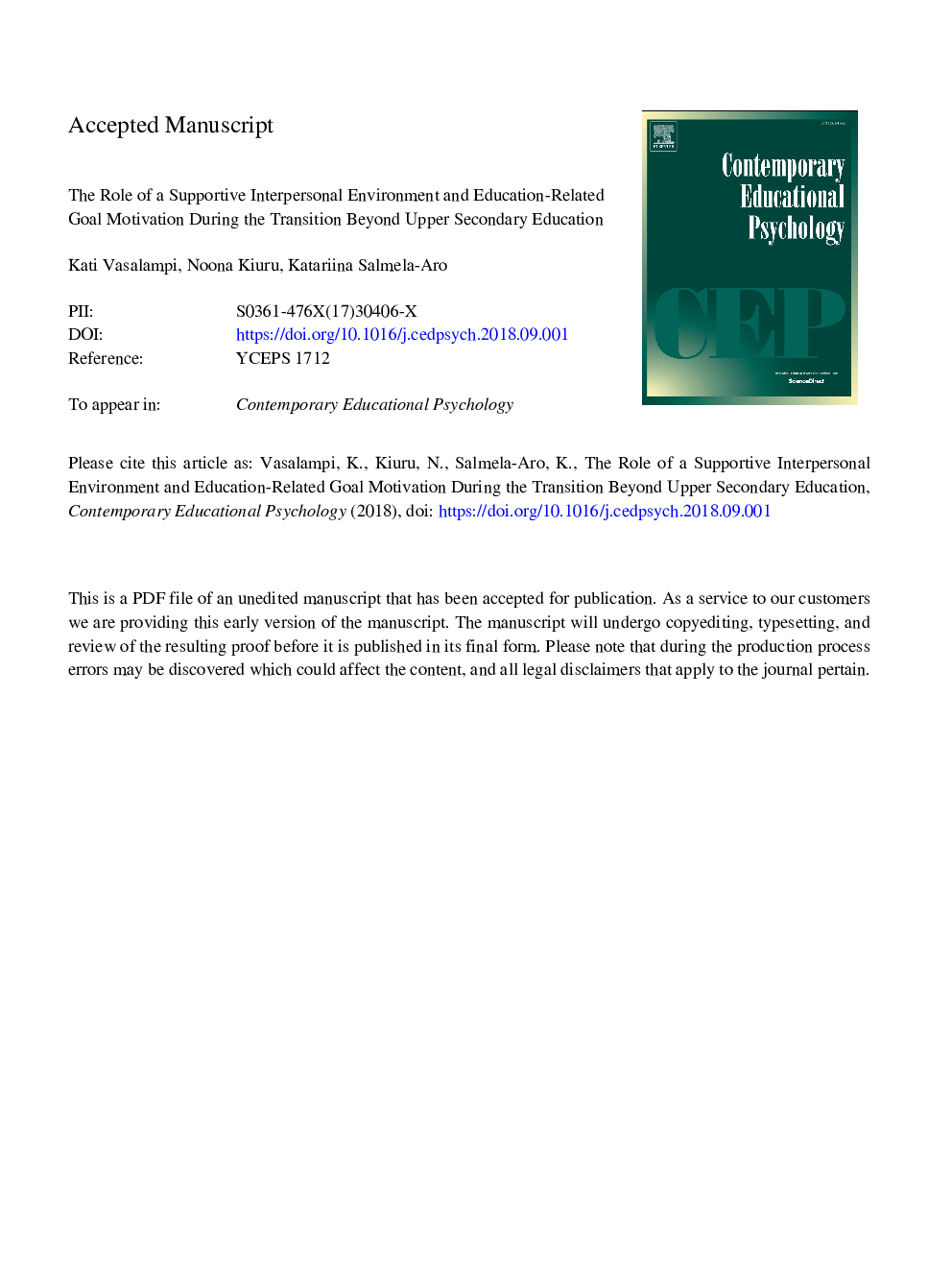| کد مقاله | کد نشریه | سال انتشار | مقاله انگلیسی | نسخه تمام متن |
|---|---|---|---|---|
| 11032939 | 1645020 | 2018 | 44 صفحه PDF | دانلود رایگان |
عنوان انگلیسی مقاله ISI
The role of a supportive interpersonal environment and education-related goal motivation during the transition beyond upper secondary education
ترجمه فارسی عنوان
نقش یک محیط میانفردی حمایتی و انگیزه هدف آموزش در حین گذار از تحصیلات عالی بالاتر
دانلود مقاله + سفارش ترجمه
دانلود مقاله ISI انگلیسی
رایگان برای ایرانیان
کلمات کلیدی
هدف آموزشی انتقال آموزشی قصد ترک کردن رضایتمندی مدرسه، رسیدن به هدف،
ترجمه چکیده
در این مطالعه طولی، نقش والدین و همسالان و همچنین انگیزه هدف آموزش در دوران تحصیل در دوران نوجوانی بررسی شد. نمونه شامل 1520 دانشجوی تحصیلات تکمیلی در مدرسه راهنمایی و تحصیلات تکمیلی در فنلاند بود. آنها سه بار مورد بررسی قرار گرفتند: (1) در سال اول تحصیلات عالی، (2) در سال دوم تحصیلات عالی و (3) دو سال بعد. نتایج نشان می دهد که در ابتدا، هنگامی که دانش آموزان تحصیلات تکمیلی، اهداف آموزشی خود را از انگیزه های خودمختار پیگیری می کردند، تلاش های بیشتری را در اهدافشان انجام می دادند که در سطوح بالایی از پیشرفت هدف منعکس می شد. به نوبه خود، پیشرفت هدف مربوط به سطح بالایی از رضایتمندی مدرسه بود، در حالی که پیشرفت هدف با هدف قصد ترک تحصیلی بود. در مقابل، انگیزش کنترل شده، نه با هدف تلاش یا پیشرفت هدف در اهداف آموزشی مرتبط نبود. دوم، محیط های مختلف بین فردی نقش های منحصر به فرد و متفاوت در اهداف آموزشی نوجوانان را ایفا می کنند. در حالی که گرما و نفوذ مادری مادران به ویژه افزایش انگیزه مستقل نوجوانان، حمایت جدی پدران به طور مستقیم از سطح رضایتمندی مدارس و نیت های کم جهت از بین رفتن از دبیرستان پیش بینی کرد. نقش پذیرش همسالان (با استفاده از روش همبستگی) دوگانه بود: این امر به انگیزه خودمختاری بالا در اهداف آموزشی نوجوانان مربوط می شود و همچنین به طور مستقیم رضایت نوجوانان با مسیر آموزشی انتخاب شده خود را پیش بینی می کند. قصد اخراج از مدرسه یک پیام هشدار دهنده مهم است که بعدا از بین برود. تجزیه و تحلیل های اضافی نشان داد که نوجوانان کمتر قصد داشتند از رشته ی متوسطه خارج شوند، بیشتر احتمال دارد که آنها در برخورد با انتقال آموزش از دبیرستان به تحصیل یا اشتغال بیشتری موفق شوند.
موضوعات مرتبط
علوم انسانی و اجتماعی
روانشناسی
روان شناسی کاربردی
چکیده انگلیسی
This longitudinal study investigated the role of parents and peers as well as of education-related goal motivation during educational transitioning in late adolescence. The sample consisted of 1520 upper secondary education students attending either academic or vocational upper secondary school in Finland. They were surveyed three times: (1) in the first year of their upper secondary education, (2) in the second year of their upper secondary education, and (3) two years later. The results show, first, that when students in upper secondary education pursued their educational goals out of autonomous motivation they also invested more effort in their goals, which was reflected in high levels of goal progress. High goal progress, in turn, was related to high levels of school satisfaction, whereas low goal progress was associated with the intention to drop out of school. By contrast, controlled motivation was associated neither with goal effort or goal progress in educational goals. Second, different interpersonal environments played unique and different roles in adolescents' educational goals. While mothers' affective warmth and involvement particularly enhanced adolescents' autonomous motivation, fathers' affective support directly predicted high levels of school satisfaction and low intentions to drop out of upper secondary school. The role of peer acceptance (measured using a sociometric procedure) was twofold: it was related to high autonomous motivation in adolescents' educational goals, and it also directly predicted adolescents' satisfaction with their chosen educational track. The intention to drop out of school is an important warning signal of later actually dropping out. Additional analyses showed that the less adolescents had the intention to drop out of upper secondary school, the more likely they were to be successful in dealing with the educational transition from upper secondary school to further education or employment.
ناشر
Database: Elsevier - ScienceDirect (ساینس دایرکت)
Journal: Contemporary Educational Psychology - Volume 55, October 2018, Pages 110-119
Journal: Contemporary Educational Psychology - Volume 55, October 2018, Pages 110-119
نویسندگان
Kati Vasalampi, Noona Kiuru, Katariina Salmela-Aro,
